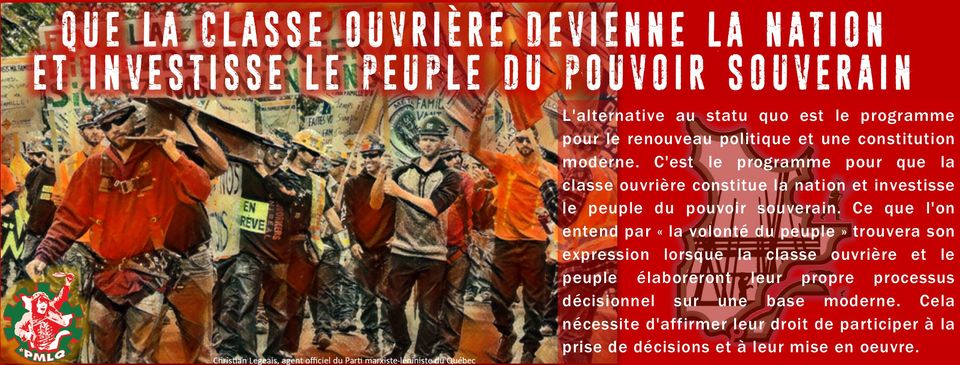October 3, 2022 - No. 24
October 3 Quebec Election
Make the Voice of the Working Class Heard!
Working People Speak Up on Matters of Concern
• Community
Organizations Reject Silence as the Response
to Their Demands
• Urgent Demands and Actions for Right to Housing
• Eating Is Not a Hobby -- Public Letter from Social Organizations
• Affirming the Dignity of Seniors
• Access to Mental Health Care
• Pronounced Deterioration of Living Conditions
for People with Disabilities
• Importance of
Training to Ensure Health and Safety
on Construction Sites
• Expressways and Skyscrapers in Quebec City for Whom?
October 3 Quebec Election
Make the Voice of the Working Class Heard!
In this election, the Marxist-Leninist Party of Quebec is championing the workers' demands. The parties in the National Assembly and the mainstream media are silent on the struggles that workers wage for their rights and the rights of all.
Currently, the Anglo-Swiss monopoly Glencore is dumping its arsenic and other polluting products into the air, particularly in Rouyn-Noranda, with complete impunity. Where is the government when Glencore must be compelled to submit to official environmental standards? This leads us to believe that these standards exist only on paper, just like the safety management systems in the railway industry which are a private prerogative of the major railway companies. Following industry lobbying, the Government of Quebec this April increased the daily limit on nickel emissions, allowing Glencore and others to dump five times more nickel dust on Quebec. Glencore's fly-in/fly-out workers in Nunavik have just finished a months-long strike against this same Glencore to obtain living and working conditions that they consider acceptable. They have been fighting the systematic use of subcontracting which prevents young workers from moving up the training and salary scales so that it becomes more and more difficult to attract and retain them.
Workers at the Lachine plant of British monopoly Rolls-Royce have just completed a months-long lockout by their employer, which wanted to destroy their defined-benefit pension plan. The U.S. monopoly Ash Grove has locked out workers at its Joliette cement plant for 16 months in order to impose conditions that make them disposable labour without stable working conditions. The mixture used to make the cement is being imported during the lockout, while workers at the Joliette cement plant normally produced it.
 None
of this has even been mentioned by the monopoly media or cartel
parties
during the election and neither has a word been said about the
struggles of health care workers for conditions that allow them
to
defend their health and care for patients in a humane and
professional
manner. Meanwhile,
health care workers and their unions have put forward solutions,
such
as a Quebec-wide law on safe health care professional-to-patient
ratios, which must be discussed to build public opinion because
they
come from those who deliver the services, who care for us and
who save
lives, often at the risk
of their own lives.
None
of this has even been mentioned by the monopoly media or cartel
parties
during the election and neither has a word been said about the
struggles of health care workers for conditions that allow them
to
defend their health and care for patients in a humane and
professional
manner. Meanwhile,
health care workers and their unions have put forward solutions,
such
as a Quebec-wide law on safe health care professional-to-patient
ratios, which must be discussed to build public opinion because
they
come from those who deliver the services, who care for us and
who save
lives, often at the risk
of their own lives.
Instead of being at the centre of the election, the workers are told, "Vote for me and you will see what will happen to you" because election promises are made with total impunity and nothing obliges the government to be held accountable when promises are broken. The old idea that the role of the workers is to compare the platforms of the parties in the National Assembly and to choose among them on this basis, does not release the initiative of the workers or give them any control over any decisions nor about what kind of Quebec is built.
We are told that this exclusion of workers is in fact normal because the real sphere of activity for workers is the negotiation of collective agreements. This is where they protect themselves, it is said, obviously only as long as they are unionized. We know that the overall rate of unionization in Quebec is approximately 31 per cent.
This too is more than problematic because the big private interests that govern Quebec and their government are brutally attacking negotiations as a means for workers to put forward their demands and obtain conditions that they consider acceptable. Dictate replaces negotiation. The large mining-metallurgical monopolies mentioned earlier in this article all have ways of moving production to other parts of their empire in the event of disputes. It is precisely against this and other forms of their dictate that the workers are now carrying out campaigns of support, including financial support, for the workers on strike or who are locked out. These campaigns are also aimed at workers in unions other than those to which the strikers or locked-out workers belong. This is one way to tackle the problem of the destruction of negotiations.
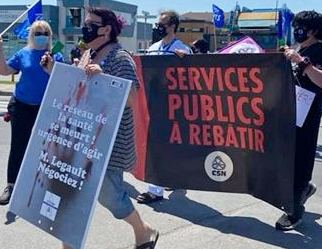 Hundreds
of thousands of health and social service workers took almost
three
years to sign their collective agreements, towards the end of
2021.
These are coming up for renewal in 2023, and few of those
agreements
seriously changed their terms and it looks like the fight is
still up
for grabs. A
striking example is the hours of care that the health
professionals
obtained in their collective agreement which are still not in
force
even though the collective agreement expires next March.
Hundreds
of thousands of health and social service workers took almost
three
years to sign their collective agreements, towards the end of
2021.
These are coming up for renewal in 2023, and few of those
agreements
seriously changed their terms and it looks like the fight is
still up
for grabs. A
striking example is the hours of care that the health
professionals
obtained in their collective agreement which are still not in
force
even though the collective agreement expires next March.
Workers are taking it upon themselves to make their voices heard in a way that is effective in making their situation known, exchanging information with others and diligently working to build public opinion for the solutions they propose for the problems they and society face. Among other actions, they participate in virtual or in-person meetings where issues are brought to the table and workers present their concerns and discuss solutions.
This directly prepares the ground for establishing a regime that gives the workers real control over political and economic power. This is how they will be able to mobilize the human factor/social consciousness at the head of a national project which serves the interests of the people.
Making the independent voice of the working class heard requires constant attention and work, which is also carried out at election time to develop workers' initiative.
Pierre Chénier is the leader of the PMLQ and its candidate in Marie-Victorin.
Working People Speak Up on Matters of Concern
Community Organizations Reject Silence as the Response to Their Demands
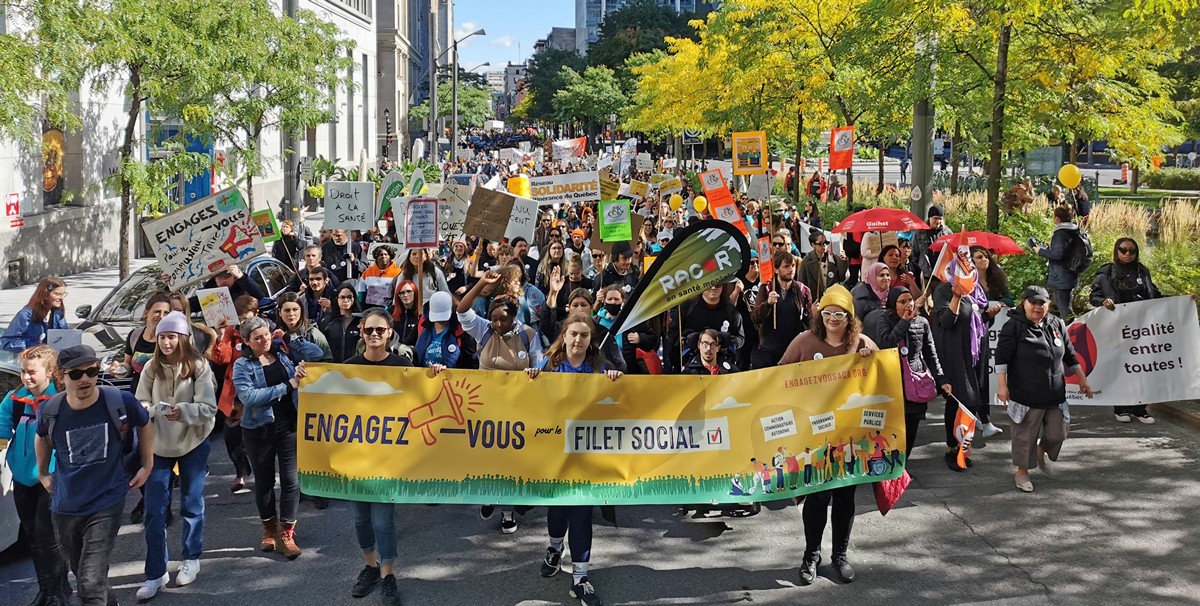
On September 29, at the call of the Quebec Network of Autonomous Community Action (RQ-ACA), hundreds of community organizations and thousands of people from across Quebec took to the streets of Montreal as part of a national demonstration to demand concrete action to protect the social safety net.
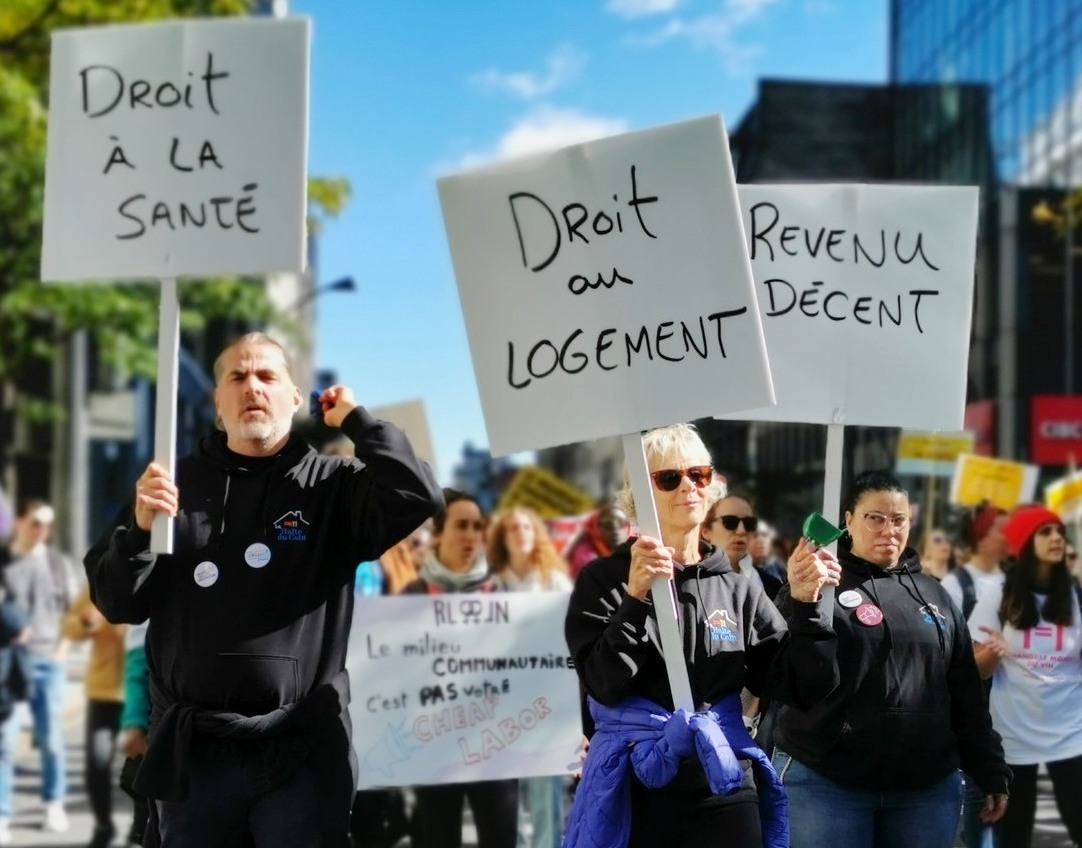 The
organizations stressed the importance of their work with
vulnerable
people in the context of the housing and inflation crisis. The
issue of
funding is at the heart of their demands. "Community
organizations are
still facing significant underfunding, despite recent
investments,"
said Caroline
Toupin, co-spokesperson for the Get Involved in Community
Campaign and
coordinator of the RQ-ACA. "Failing to adequately fund the
community is
inevitably leaving citizens behind," she says.
The
organizations stressed the importance of their work with
vulnerable
people in the context of the housing and inflation crisis. The
issue of
funding is at the heart of their demands. "Community
organizations are
still facing significant underfunding, despite recent
investments,"
said Caroline
Toupin, co-spokesperson for the Get Involved in Community
Campaign and
coordinator of the RQ-ACA. "Failing to adequately fund the
community is
inevitably leaving citizens behind," she says.
Their main demands are:
- Funding of the missions of all of Quebec's 4,000 community organizations "to allow them to do what they were founded to do: help members of their communities. In addition, it is imperative that the government index annually these grants for all organizations."
- Major investments in public services and social programs because "they are indispensable for the respect of human rights and essential to ensure a decent standard of living for all."
 -
Better distribution of wealth: "Solutions exist to strengthen
and
significantly fund the social safety net and we must have the
political
courage to do that. It is intolerable that the government should
deprive itself of the means necessary to reinvest in the common
good."
-
Better distribution of wealth: "Solutions exist to strengthen
and
significantly fund the social safety net and we must have the
political
courage to do that. It is intolerable that the government should
deprive itself of the means necessary to reinvest in the common
good."
Roxanne Milot, spokesperson for the Regional Front for Autonomous Community Action (FRACA) of Montreal adds: "For us, social justice rhymes with fiscal justice. The wealthy must give back their fair share to the society that allowed them to accumulate a fortune. It's time for them to contribute more to the common good, because everyone should be able to meet their basic needs with dignity."
To read the full statement click here.
(Quotations translated from the original French by TML. Photos RIOCM)
Urgent Demands and Actions for Right to Housing
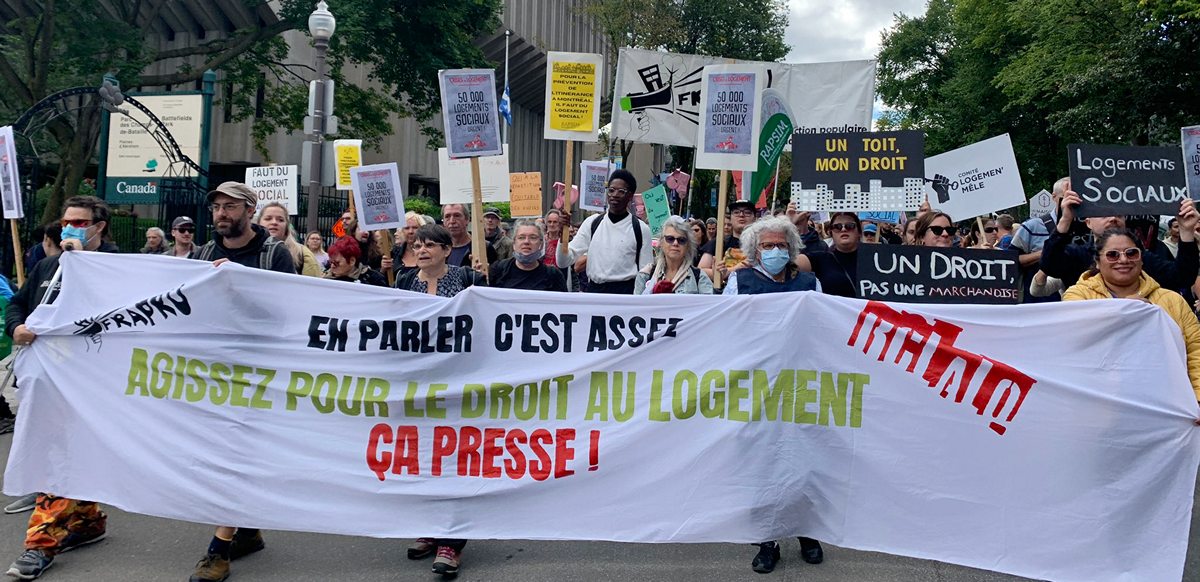
Demonstration in Quebec
City, September 16, 2022, demands solutions to the housing
crisis.
In the Quebec election, organizations defending the right to housing are taking a firm stand on the housing crisis that is hitting low- and modest-income individuals and families particularly hard. They are putting forward demands based on social housing in order to resolve the crisis.
The People's Action Front for Urban Renewal (FRAPRU) and the Regrouping of Housing Committees and Tenant Associations of Quebec (RCLALQ) organized a demonstration on September 16 in Quebec City demanding solutions to the housing crisis, including rent control and social housing.
In its August 26 press release, FRAPRU writes:
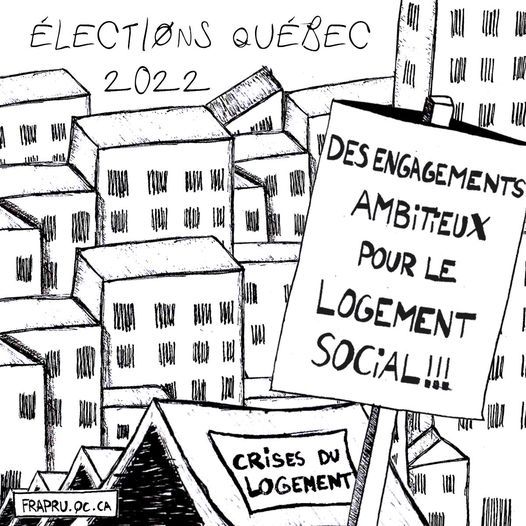 "Like
the municipalities and several other bodies, FRAPRU is concerned
about
the unprecedented deterioration of the rental housing situation
in
Quebec: a rapid increase in the rents of available housing, a
critical
scarcity of family housing, an increase in fraudulent schemes
induced
by real
estate speculation. The group notes the equally rapid
impoverishment of
tenant households, more and more of whom are at risk of finding
themselves on the street.
"Like
the municipalities and several other bodies, FRAPRU is concerned
about
the unprecedented deterioration of the rental housing situation
in
Quebec: a rapid increase in the rents of available housing, a
critical
scarcity of family housing, an increase in fraudulent schemes
induced
by real
estate speculation. The group notes the equally rapid
impoverishment of
tenant households, more and more of whom are at risk of finding
themselves on the street.
"According to the organization, solutions exist and are known. Social housing is one of the essential and sustainable responses to the current crisis. Because it is non-profit and subsidized by the State, it takes profit out of the housing equation and protects tenants from the excesses of the private market by offering them a safe roof for which they are able to pay. 'But above all, by being collectively owned, social housing, whether cooperative, non-profit or public, remains indefinitely affordable,' reiterated Véronique Laflamme, spokesperson for FRAPRU."
According to FRAPRU, the latest available data from Statistics Canada is very clear on the need for social housing. It writes:
"More than 195,000 renter households in Quebec already spend half or more of their income on housing, which is well above the 30 per cent standard recognized by the SHQ [Housing Board]. According to the organization, the long waiting lists for low-cost housing (HLM) -- which total more than 37,000 registrations -- illustrate the urgency to act, but indicate only part of the needs by counting only the eligible households that have made a request. This list also does not take into account the thousands of households hoping to obtain a place in a non-profit organization (NPO) or housing cooperative."
FRAPRU is presenting the following demands to the parties running in the October 3 election:
- the creation of 50,000 social housing units in five years, through cooperatives, NPOs and housing offices;
- the financing of all social housing already set for several years under the AccèsLogis program, but still awaited, despite the promise of the outgoing government (which only delivered one-third);
- the implementation of a global housing policy based on the right to housing, the development and protection of social housing and better protection of tenants' rights; and
- that funds invested in housing development be exclusively reserved for social housing.
A few days after the election was called, TML spoke with Laflamme, who emphasized the importance that housing rights organizations place on social housing. She said:
"As we can see, the housing crisis is part of the concerns of the population of Quebec, especially the rising cost of rent. If we are to have any hope of getting out of this housing crisis, and if low- and modest-income tenants are to have any hope of getting out of the dead end in which they are currently caught, we must make ambitious commitments, and these commitments must be about social housing outside the private market.
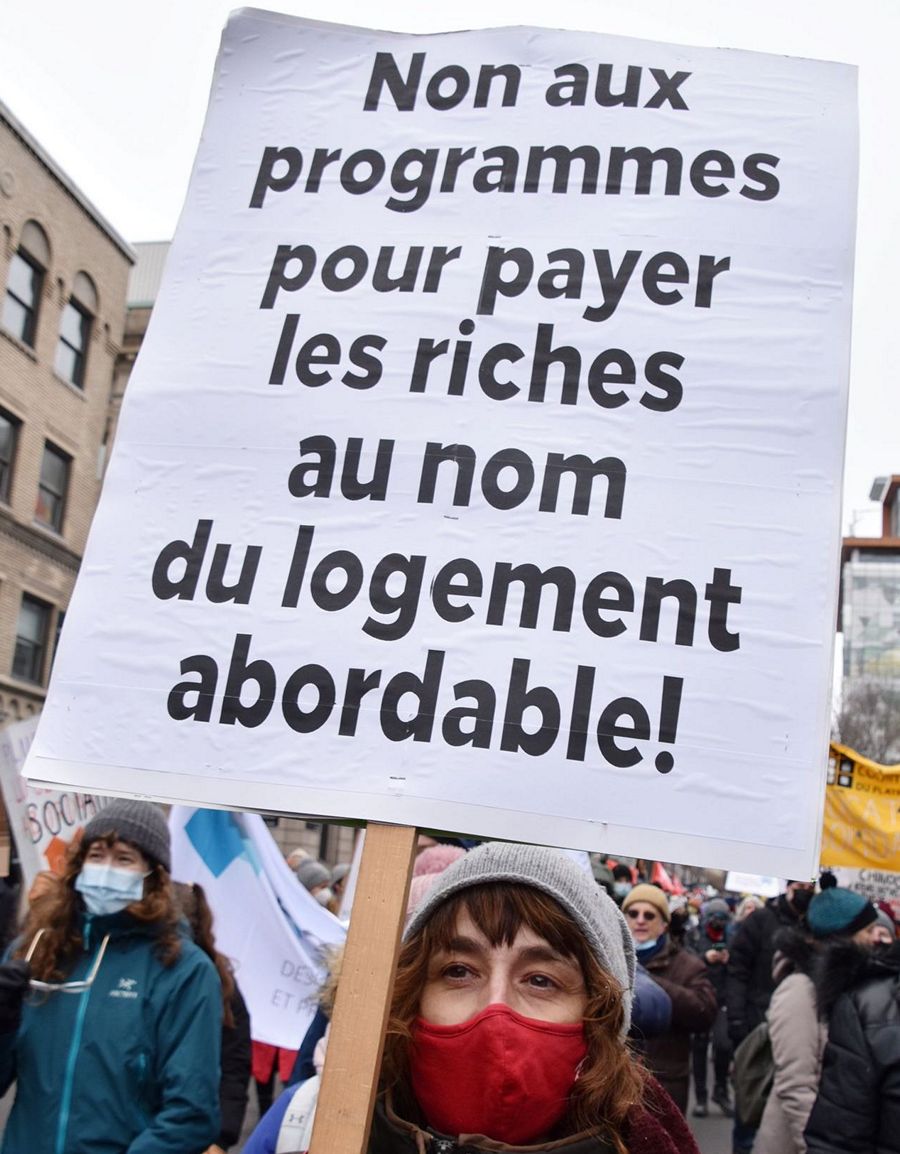 "We
are currently seeing a shift from social housing to affordable
housing
as we hear that social housing is allegedly equal to subsidized
housing. This actually opens the door to passing off aid to the
private
sector as social housing.
"We
are currently seeing a shift from social housing to affordable
housing
as we hear that social housing is allegedly equal to subsidized
housing. This actually opens the door to passing off aid to the
private
sector as social housing.
"Social housing is housing outside the private market, collectively owned housing, on which no one makes a profit. It can be public housing, cooperative housing or non-profit housing.
"The introduction of a new program, the Quebec Affordable Housing Program, which finances private owners as well as non-profit bodies, makes this change in vocabulary even more problematic. Privatization of housing assistance comes with this, with not informing how many of these units will actually be social, that is, outside the private market.
"Meanwhile, the AccèsLogis program, which for 25 years exclusively financed social housing in Quebec, is being abandoned. This system has been underfunded."
In conclusion, Laflamme called for a mass mobilization during the election campaign. The Quebec City demonstration on September 16 calling for solutions to the housing crisis was a part of this.
"We invite tenants to make their voices heard during the campaign. Already people are speaking out in various media. They remind us that rents are too high, that social housing is what is needed.
"I also want to say in conclusion that we must not fall into the trap of income tax cuts that some parties announced in the first days of the campaign. These cuts will not put more money in the pockets of low-income households and billions of dollars will be lost. A $2 billion tax cut means 12,000 social housing units per year that could have been built. We have the means. It's a question of political choice."
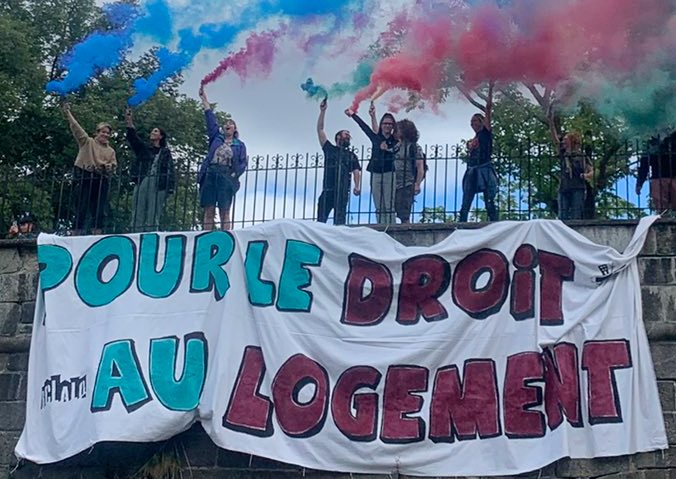

Quebec
City, September 16, 2022
(Quotes translated from the original French by TML. Photos: TML, FRAPRU)
Eating Is Not a
Hobby -- Public Letter from
Social Organizations

Who Can Still Eat?
When the more affluent in our society worry and change their eating habits in the face of staggering inflation of 8.1 per cent in June 2022 and exploding food prices, what happens to Mr. and Mrs. Everybody?[1] Who can find it normal to pay more than $8 for a pound of butter?
Citizens are not the only ones to be confronted with this aberration. Community organizations that come to their aid have rarely been so called upon. More and more people are knocking on the doors of our organizations, which are also at their wit's end, because the means to respond to these solicitations are limited: lack of human resources (volunteers or employees), cost of operation and to this is now added the disproportionate cost of food.
The demand for access to food has changed in recent months, both in terms of the cost of food and in people's ability to supply themselves. This last resort assistance is now compulsory to balance, as much as possible, the family budget. Before this inflationary increase, groups could work miracles with tight budgets, now it's downright impossible.
Food insecurity is increasing and the means to respond to it are insufficient.
While Mr. and Mrs. Everybody are anxious in the grocery store, the profits of big food companies are increasing and reaching great heights.[2] Is this the society we want? Could we not sit down together to put in place fair solutions, because the impacts of these price increases are catastrophic? In addition to considerably undermining the already very low purchasing power of citizens, inflation imposes heartbreaking decisions. What can we pay this month? What is left for electricity, rent, clothes, medicine?
When, insidiously, the fridge empties and the stove cries famine, the citizens, even animated with the best intentions, often find themselves helpless when their income is not enough to fill the pantry. For too many people, regardless of their social status, the perennial question "What's for supper?" turns into the ugly reality: "Are we eating supper?"
During this election period, promises of tax cuts or sporadic sending of cheques will have little impact on individuals and even less on the community. The future government should rather give priority to structural social measures such as an increase in the minimum wage, social assistance, social solidarity and retirement benefits, etc. Unlike candy vouchers, these measures could make a difference for the most vulnerable people in our society, allowing us to face the increase in the cost of food with a little more optimism.
Currently, community organizations seem to be the only ones taking this dire situation seriously by putting in place solutions allowing citizens to retain power over their lives and to be treated with dignity. The signatories of this letter invite the political parties to come sit down with them to share their proven strategies while making sure they have the means to endure.
Recognition of the right to food is essential to enable everyone to feed themselves appropriately based on these four components: accessibility, adequacy, sustainability and food availability.
At the time of publishing this letter, we are deeply disappointed to note that the right to food is not a priority for any political party. If the parties are concerned about the well-being of the population, as they claim, this basic need should be a priority and measures making it possible should be proposed.
The future of society as a whole is at stake.
Josée Poirier Defoy
Quebec Collective
Kitchens Association (RCCQ)
Isabelle Lachance
Meals on Wheels
Association (RPR)
André Guérard
Quebec Association of
Community Centres for Seniors (AQCCA)
Michel Alexandre Cauchon
Federation of Volunteer
Centres of Quebec (FCABQ)
Notes
1. Statistics Canada Consumer Price Index, June 2022.
2. "Metro: ventes et profits en hausse au 3e trimestre," Les Affaires, 8 août 2022.
(Translated from the original French by TML.)
Affirming the Dignity of Seniors
On the occasion of National Seniors
Day, October 1, the Quebec Golden Age Federation
(FADOQ) Network
issued a press release stating that "Quebec must ensure that all
seniors can live in dignity, regardless of their income or place
of
residence. The pandemic has highlighted the importance
of improving their quality of life."
The FADOQ Network brings together and represents people aged 50 and over with nearly 525,000 members, 16 regional groups in Quebec, over 700 clubs and some 10,000 volunteers.
Below are excerpts from an article by Stéphane St-Amour, published in the Courrier Laval, which presents the organization's demands to affirm the dignity of Quebec's seniors:
[These] specific demands are divided into four parts related to health care, protecting rights, experienced workers, and taxes.
Taxes
[...] In Quebec, six out of 10 seniors live on annual incomes of $30,000 or less, with more than half (58 per cent) receiving incomes of less than $20,000.
For the Network, dental care as well as the purchase of glasses and hearing aids should be covered by the Quebec Health Care Plan or be eligible for a grant.
[...]
The fourth and final request in this section is to double the Quebec Pension Plan (QPP) death benefit, as the maximum amount of $2,500 paid to the estate has never been increased, adjusted or indexed since this tax measure was introduced in 1998.
According to a study published five years ago, this taxable benefit covered only 37 per cent of the average cost of funeral expenses. In 2018, the Institute for Research and Socio-Economic Information (IRIS) estimated that the additional cost to the government of raising the maximum death benefit to $5,000 would be $118 million.
Experienced Workers
To address the current labour shortage, it is proposed that these two incentives be put in place to encourage experienced workers to return to the labour market or even postpone their retirement:
- Double the amount of time a QPP claimant can choose to stop receiving their QPP pension. Right now it's six months.
[...]
- Extend the income replacement benefit for disabled workers.
Protecting Rights
In this housing crisis, the FADOQ Network is asking for two legislative changes to protect senior tenants.
- Exclude private seniors' residences (PSRs) from the provisions of article 1955 of the Civil Code of Quebec (clause F), which prevents a tenant from refusing a rent increase under certain conditions.
- Allow joint applications to be filed in connection with the setting of rent so that annual increases can be contested jointly before the Administrative Housing Tribunal (TAL). Currently, if all the tenants of the same PSR wish to contest a rent increase applicable to all, each resident must individually take action before the TAL.
[...]
Health Care
In terms of health care, the shift towards home care must be orchestrated in the first months of the mandate of the party that will come to power, according to the FADOQ Network, which has made it a national priority.
"Quebec spends only 1.3 per cent of its gross domestic product (GDP) on long-term home care for seniors, compared to the Organisation for Economic Co-operation and Development (OECD) average of 1.7 per cent," it maintains.
To accelerate the transformation of the health care system to meet the needs of an aging population, the Network's demands are as follows:
- Increase investment in home care.
- Deploy intensive home care (IHC) teams across Quebec.
- Break down the silos of health professions.
- Implement an ambitious workforce staffing plan and establish safe care ratios over the medium term.
To read the complete list of the FADOQ Network's demands click here.
(Quotations translated from the original French by TML.)
Access to Mental Health Care
In an open letter published in Le Devoir on September 30, the Coalition of Public Sector Psychologists (CPRPQ) calls for greater access to psychologists' services in the public health and education systems. It is calling for unique, free services that are integrated in the community, services that have the potential to save a lot of suffering in Quebec, as well as money.
The organization has carried out several actions. These include 185 media appearances, several exchanges with the office of the Minister of Health and Social Services Lionel Carmant, drafting seven briefs, presenting an investment plan that would save Quebec more than $228 million annually, a rally of more than 300 people in downtown Montreal, and a petition signed by more than 7,000 Quebeckers.
Despite this, Minister Carmant "closed the door on the solution proposed by psychologists in the field, namely the formation of a union of psychologists to attract and retain psychologists in the public network," says the Coalition.
"Instead, the Minister seems to rely on self-care guides found on the Internet or on hiring other employees, some of whom have very limited training in mental health. These initiatives unfortunately do not address the full range of the population's needs, which are increasingly complex," it says.
Another problem the Coalition is addressing is that as of September 2023, unless the situation changes, many of the next generation of students will not be trained because of the burnout and overload of psychologists in the public system. Doctoral students in psychology must complete 2,300 hours of a mandatory internship in order to graduate. "Due to the continuing departures of our colleagues, there are not enough psychologists left to meet that need," the Coalition writes.
The signatories to the letter conclude: "We will fight to the end for this cause as it is much greater than us. We cannot leave the population without access to this vital service."
The Coalition is also circulating a petition, which can be found here.
(Quotations have been translated from the original French by TML.)
Pronounced Deterioration of Living Conditions
for People with Disabilities
Reprinted below is a position paper by Amélie Duranleau, Executive Director of the Société québécoise de la déficience intellectuelle, Lili Plourde, Executive Director of the Fédération québécoise de l'autisme and Sylvie Tremblay, Executive Director of the Regroupement provincial des comités des usagers which was published in Le Devoir on October 1.
In recent years, access to housing for people with an intellectual disability, a physical disability or an autism diagnosis has deteriorated. As the pandemic revealed, the situation was already critical. Whether due to a lack of funds, an organizational problem or a lack of political interest, people with disabilities who are housed in the health and social services network have seen their living conditions deteriorate considerably.
 These people, most of whom are vulnerable, and their families, are
faced with a shortage of places in alternative living environments and
an almost total lack of political interest. There is virtually no
support from the Ministry of Health and Social Services or the Ministry
of Municipal Affairs
and Housing for the creation of community-managed living environments,
which only increases the pressure on existing living environments. Yet
the federal government has committed significant funds to the
construction of housing resources for people with disabilities. What
has happened to this
money?
These people, most of whom are vulnerable, and their families, are
faced with a shortage of places in alternative living environments and
an almost total lack of political interest. There is virtually no
support from the Ministry of Health and Social Services or the Ministry
of Municipal Affairs
and Housing for the creation of community-managed living environments,
which only increases the pressure on existing living environments. Yet
the federal government has committed significant funds to the
construction of housing resources for people with disabilities. What
has happened to this
money?
Worse still, for several years now, the Société québécoise de la déficience intellectuelle has been noticing a resurgence of institutions in the province. Of course, they no longer resemble the ones popularized in One Flew Over the Cuckoo's Nest: they are smaller, the deprivations of freedom are less obvious, but people are still locked up, their rights are violated and they have no control over their lives. Services are limited and living conditions are often inadequate. It should be noted that the rampant privatization of housing resources has not helped either, as working conditions are often deplorable.
For its part, the Fédération québécoise de l'autisme has been pointing out for many years the serious dysfunctions of the health and social services network, particularly in terms of housing. In 2019, it had also painted a picture of the living environments for autistic adults other than the family home. Beyond these observations, a series of recommendations were made to improve these living environments and to guarantee a sufficient number of adapted places with reasonable waiting times.
The Regroupement provincial des comités des usagers (RPCU) adds that as users of the health and social services network, we have fundamental rights recognized by the Act respecting health services and social services (LSSSS), including the right to receive the care required by our condition and the right to accommodation.
The articles published recently prove that there is a real urgency to review the existing models and to adopt mechanisms to control and verify the quality of these living environments. These mechanisms existed less than 15 years ago and were abandoned as the system was reformed. It is important to restore them as soon as possible. Why not generalize this possibility to all living environments?
Ultimately, investing more money in a broken system will not solve the multiple problems. What is needed here is a real rethinking of existing models and ways of doing things. New, more inclusive models are needed, more support services and home care must be mobilized, and the community must be engaged. People with disabilities, regardless of their level of need, want to be included in the community, they do not dream of living in nursing homes or "seniors' homes."
The current model of segregation and institutionalization, particularly through recourse to the private sector, which is becoming widespread, is worrisome and suggests even more massive setbacks for people with disabilities. Faced with this state of affairs, we must rely on the ideas and capacities for self-determination of the persons concerned, the commitment of families, the community sector and researchers.
It remains for the government and its various departments to do what they are elected and appointed to do: work for the common good, without excluding the most vulnerable. The state can and must do better.
(Translated from the original French by TML.)
High Level of Illiteracy
Literacy refers to an individual's ability to read, understand and
process written information. Literacy is therefore essential to
making informed decisions, achieving personal goals, and
functioning in society. It also includes the concept of skill
development.
According to the Program for the International Assessment of Adult Competencies (PIAAC) survey conducted in 2012 (the most recent data available), the dramatic situation in Quebec is that 53.3 per cent of Quebeckers between the ages of 16 and 65 (slightly more than one in two people) do not achieve level three literacy, i.e., being able to read dense or long texts that require interpreting and making sense of information.
Since 2012, the education system has been victim of an anti-social offensive with millions of dollars being taken away by successive governments. Clearly, the situation has deteriorated since then.
According to Wikipedia, the term illiteracy describes the inability to use reading, writing, and calculation skills, while literacy assesses the ability to do so. Literacy is the acquisition of the basic knowledge and skills that everyone needs in a rapidly changing world.
There are six levels of literacy:
0) Knows basic vocabulary.
1) Understands short texts with one piece of information.
2) Makes connections between text and information in texts with two or more pieces of information.
3) Reads dense or long texts requiring interpretation and making sense of information.
4) Evaluates long and complex texts requiring prior knowledge.
5) Is able to integrate, evaluate, and synthesize multiple texts and their subtleties. Requires specialized prior knowledge and understanding of logic and concepts.
The Literacy Foundation points out that the impacts on illiterate people are many:
- Limited ability to obtain and understand critical information;
- Unemployment: the unemployment rate is two to four times higher among those with little education than among those with a bachelor's degree;
- Lower incomes;
- Lower-quality jobs;
- Reduced access to ongoing education and professional development;
- Financial insecurity;
- Low interest in education and reading in the family often resulting in intergenerational transmission of illiteracy;
- Low self-esteem that can lead to isolation; and
- Health consequences: illiterate people experience more accidents in the workplace, take longer to recover, and are often more likely to misuse medications due to lack of knowledge of health care resources and difficulty reading and understanding relevant information (warning, dosage, contraindication, etc.)
Without the basic tools necessary to achieve their goals, individuals with inadequate literacy cannot participate fully and equally in social and political discourse.
The fight to stop paying the rich and to invest in social programs, health and education is imperative if all human beings living in Quebec are to flourish.
Linda Sullivan is the PMLQ candidate in Sainte-Marie-Saint-Jacques.
(The Literacy Foundation.)
Challenges for Educators
First, the numbers. When we talk about education workers in schools, we mean the nearly 99,000 teachers working with 1,370,000 students in elementary, secondary and adult general education and vocational training. Our colleagues are educators, speech therapists, psychologists, psychoeducators and support staff. As for nurses and social workers, they are in our schools as per agreements with local community clinics.
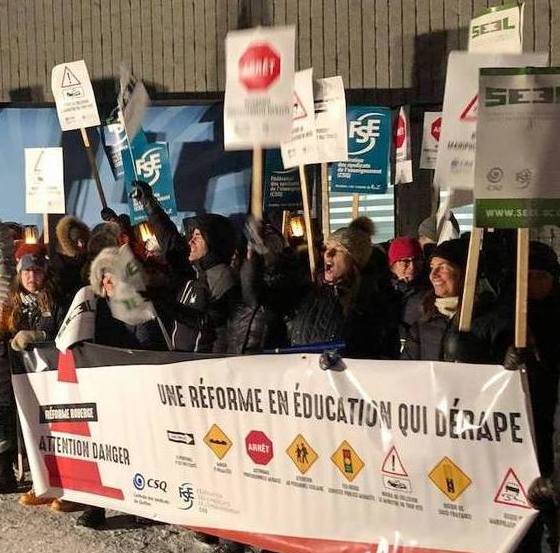 For teachers, almost without exception, Legault's governance has been synonymous with the
concentration of power in the hands of the executive (remember
Bill 40 which, among other things, abolished school boards) and
an increase in arbitrariness in setting teachers' working
conditions,
from one school to another, and even among teachers. This is intensified by what is called the annualization
of the task.
For teachers, almost without exception, Legault's governance has been synonymous with the
concentration of power in the hands of the executive (remember
Bill 40 which, among other things, abolished school boards) and
an increase in arbitrariness in setting teachers' working
conditions,
from one school to another, and even among teachers. This is intensified by what is called the annualization
of the task.
In a nutshell, it used to be that our workload was divided into hours per week -- so many hours for teaching, so many minutes for an extracurricular activity, so many minutes for preparing lessons, etc. In the last negotiations, it seems that in order to get the salary increases we got, we had to agree to change our job from hours per week to hours per school year. We don't know all the consequences of this, but already we can see that annualization increases the number of periods when we must be available for the different committees set up by management.
So there is an anticipated increase in tasks. How do we turn this to our advantage? It means a lot of discussion among ourselves is required so that we don't fall victim to each administrator's interpretation of the annualization of work. For experienced teachers, it also means paying attention to our younger colleagues who often don't dare to question management's decisions for fear of being targeted.
Another element that creates insecurity is the integration -- which we call brutal -- of students with special needs. There are those we know well: dyslexic students who need more time and support to master a concept, disorganized students who also need time and space to vent their anger and frustrations, students with motor disabilities who require specialized equipment to complete a task, or students with language impairment who struggle to understand and perform a task if they don't have an intervener by their side to take the time it takes (I have a student who takes, on average, one minute to answer a simple question because the words don't come to him). They are among 30 or so other students and their needs cannot be met.
The pressure on the teachers is enormous, as they are told that they must explain the task differently, according to the so-called needs. Under the Legault government, it is the teacher who is blamed if he or she does not adopt "evidence-based" learning methods. It is the teacher who must change, not the conditions that would allow him or her to do what is needed.
Teachers and their colleagues are also in a situation where previous arrangements for transmitting information, the structure of student support, role of counsellors, etc. are being destroyed. The challenge before us is to create new arrangements that serve our social responsibilities, and thus, the needs of our students.
For example, a few days before the start of the school year, we learned that a group of students from a special needs school would be transferred to our school. They are non-verbal autistic children with intellectual disabilities. Because the special needs school was overflowing, the School Service Centre sent this group to our school, without taking any responsibility for the conditions and the necessary training that the people working with these young people must have.
In short, by mid-September, following two difficult episodes with two of these youth, we were down three injured staff members, two of whom have since been put on extended leave. We have countered the pressure of silence among our peers, who may fear being blamed, by collectively educating ourselves about the needs of these students, and the type of materials they require so we are in a position to ask management to provide it, along with adequate training for the staff around them.
For us, decreases in teacher/student ratios and the addition of direct services are the starting point for humanizing the education system. Because this requires massive investments, which challenge the orientation of the economy towards private interests, these demands are more than denied, they are not even part of the public discussion. The government simply does not allow it.
Also, especially since the pandemic, school workers are noticing how their workplaces are increasingly dealing with the consequences of the anti-social offensive in all sectors of society. Our students and their families are living with generalized insecurity, financial precariousness, and lack of health and social service resources. We live with them every day, and in fact, schools are increasingly becoming the place where families turn for warm clothing, lunch for their children, support for their children's anxiety, or help for themselves as parents to fill out forms or to help ease the tension between them and their children.
What this means is that teachers and their colleagues, by pooling their experience and knowledge, are able to provide solutions to the vast majority of problems in education and this also contributes to the well-being of the whole community. The obstacle is that teachers are not in the equation of the decision-making in education and that is what needs to change. Teachers and their colleagues in the education sector have no choice but to work together every day to find solutions to the many problems they face. They need the support of the entire community to ensure that this discussion is in the public arena when it comes to education.
Geneviève Royer is a director of the Marxist-Leninist Party of Quebec and the PMLQ candidate in Pointe-aux-Trembles. She has been a remedial teacher for nearly 30 years and is a union representative for her school.
Importance of Training to Ensure Health and Safety on Construction Sites
Training of construction workers is important to ensure the health and safety of workers on construction sites and the safety of the public. The training issue is one of the main aspects of my work. Last week, the coroner's report on the July 2021 accident at the Solar uniquartier condo development site in Brossard was released. An apprentice was killed because of a poorly secured load on a crane.[1] He was not trained and the crane operator himself was not trained.
Lack of training is a big problem in construction. The more it goes on, the more people come in through the labour pools. There is a shortage of apprentices in construction, so the Quebec Construction Commission (CCQ) allows anyone who can get a 150-hour job guarantee to enter the construction industry. There are fewer and fewer competent people on the construction sites.
 As
far as crane operators go, you can't become a crane operator
through
labour pools. We've hardly ever had one, in fact only once in
our
history. But for many other trades, such as carpenters, general
labourers, heavy equipment workers, there are many workers who
enter
through the labour pool,
without initial training.
As
far as crane operators go, you can't become a crane operator
through
labour pools. We've hardly ever had one, in fact only once in
our
history. But for many other trades, such as carpenters, general
labourers, heavy equipment workers, there are many workers who
enter
through the labour pool,
without initial training.
Despite our struggle, we have not been able to maintain the mandatory nature of the crane operator training. There is now a mandatory 120-hour training program in a Quebec City school, the FPE, while the vocational training leading to a Diploma of Vocational Studies (DEP) is 872 hours. From what we hear, there are few students enrolled in the FPE because the costs for the students are quite high. Also, if the student fails his or her final exam, he or she is not allowed to retake it and must take a DEP. We are still fighting for DEP training or recognition of prior learning.
A safe crane operator trade is central to the health and safety of workers and the public.[2] A bad manoeuvre, if the crane tips over, or parts of the load are dropped, is enough to injure or kill someone. It is the crane operator who must enforce what the machine manufacturer allows. If it's too windy, it's up to the crane operator to say he's not doing the lift. It is his responsibility to make the decision because by doing the lift in these conditions, he can have an accident. He has to make sure that the loads are properly secured. Rain or shine, he must set up his crane properly to work as safely as possible.
Health and safety is the main aspect of my job. I do a lot of site visits to make sure that all health and safety issues are respected.
Right now, we have big problems with lifts that are done side by side. In order to save time, we often lift several loads at once on a single crane that are suspended separately instead of one load at a time. People can be injured by doing this. There is a lot of pressure on the worker to save time and go faster.
This is done to the detriment of the worker and it can have a serious impact on the public as well.
Alain Doyle is the Director of the
Union des opérateurs grutiers, Local 791-G of the
FTQ-Construction.
Notes
1. On July 8, 2021, a 34-year-old worker was killed on a construction site in Brossard.
The worker was working that day loading formwork equipment onto a flatbed semi-trailer truck. To do so, the worker attached a load of eight formwork panels with two slings (ropes). This load was lifted and transported with a tower crane to the drop-off point on the flatbed truck. As the load was being lowered, it slipped off the slings on which it was supported. The load hit the flatbed of the semi-trailer truck, causing two formwork panels to be thrown off. These panels hit the worker who was on the truck bed to guide the load down. The worker was propelled into the air and fell to the ground. He died instantly. In her report, the coroner denounced the employer for using a slinging method that is now common on construction sites and that does not take into account the possibility of the load slipping.
2. For more information on the crane operators' fight against the weakening of the training standard that affects them, read the June 26, 2018 issue of Workers' Forum, "Unacceptable Actions of Quebec Government -- Crane Operators Back on the Job: the Fight Continues."
(Translated from the original French by TML.)
Expressways and Skyscrapers in Quebec City
for Whom?
 What is Quebec City's "third link"?
It's the Legault government's
proposed expressway tunnel between Quebec City and Lévis, under
the St. Lawrence River east of the Pierre-Laporte and Quebec
Bridges,
which are the first two "links." It began as a Coalition Avenir
Québec (CAQ) election promise during the 2018 Quebec election.
Since then, the project has expanded. Premier Legault is now
talking
about two tunnels, smaller in diameter, from downtown Lévis
directly to downtown Quebec City.
What is Quebec City's "third link"?
It's the Legault government's
proposed expressway tunnel between Quebec City and Lévis, under
the St. Lawrence River east of the Pierre-Laporte and Quebec
Bridges,
which are the first two "links." It began as a Coalition Avenir
Québec (CAQ) election promise during the 2018 Quebec election.
Since then, the project has expanded. Premier Legault is now
talking
about two tunnels, smaller in diameter, from downtown Lévis
directly to downtown Quebec City.
The transportation and real estate sectors and their interconnections are always very complex to examine and comprehend. However, there are definitely big financial interests at stake, often foreign.
When you arrive in Quebec City by the Miche coast in the east, or from the west by Autoroute 40, you can see the pollution over the city. The riding of Jean-Lesage is surrounded by three expressways: Henri IV, La Capitale and Dufferin-Montmorency. The cloud of pollution over the city is due in large part to transportation. Diesel emissions from truck, train and boat transport in the Old Port contribute to lung cancer related to air pollution. Traffic jams, a nightmare for drivers, extend in all directions, from the south to the north shore, to Pont Rouge and Ste-Catherine de Portneuf.
And then there are the two existing bridges in Quebec City. Currently, the federal government, the Canadian National Railway Company and the Quebec government are bickering over the need for repairs to the deteriorating Quebec Bridge. As for the Pierre-Laporte Bridge, a recent report urges the replacement of all its cables, "the sooner the better." It requires urgent repair because of the deterioration of the suspension cables supporting it. For its part, the government "reassures the population" that the bridge is safe and is using its emergency powers to award expensive contracts in case of an emergency... a power it extended for five years after invoking it during COVID-19.
It is now obvious that in transportation, the same vision that led to the current crisis is being put forward according to this model of capitalist development of cities with expressways and skyscrapers. While the first and second links are in danger and poorly maintained, the Legault government is presenting its third link project. This project reflects the vision of "developers and decision-makers" behind whom are hidden hedge funds such as Blackstone, MACH and Canderel, who participated in the buyout of Cominar (a private company specializing in commercial real estate). It's the selling out of the country to foreigners, the plan of the elites to place all the resources at the disposal of the financial oligarchs. Note also that Brian Mulroney sits on Blackstone's board of directors. What all this reveals is that the power of people to decide is sorely lacking.
Collective Memory
In the '70s, while doing door-to-door work, I witnessed the destruction of houses in the St. Roch district. Mechanical shovels wrecked houses to make way for the expressway. The vision presented by promoters at that time -- not that of ordinary people deprived of decision-making power -- was that progress would be made through expressways and big hotels. It was said that a certain Mr Racine, a Quebecker, was the promoter but it turned out that the interests behind this "development" were from the U.S.
Planning and Urbanism for Whom?
Cominar is a major player on the modern urban planning scene. The company owns 190 buildings in Quebec City. Its plans for the city include a 65-storey skyscraper nicknamed "the Lighthouse." The name associated with the Lighthouse project was Dallaire, a Quebecker. He was eyeing the last remaining farmland in Beauport to build on. He faced fierce citizen opposition which won the day. The Legault government was forced to buy back the land from the Sisters of Charity and to promise to keep the land zoned as agricultural. Citizens remain vigilant.
The saga doesn't end there. What made it clear for me was then Mayor Labeaume's response which was to finance, from the city's budget, the expansion of Hochelaga Boulevard from four to six lanes between Laval University and the future site of the Lighthouse.
In all these things one can see the answers to the questions "why" there should be municipal mergers, a big city, a big mayor, more power. To make it easier for "developers, decision-makers" to have all the resources of the region at their disposal. Who is going to foot the bill for the installation of water, sewage, electricity, and surely a planned structured transportation network? We wonder.
Do we want a Quebec City of expressways and skyscrapers, as we see in many Canadian cities? I don't think so. Vigneault, our national poet, used to say that there are two kinds of desert, the one where the sand stretches out before us and the other that rises vertically, the concrete of skyscrapers.
Meanwhile, Legault presents himself as the defender of drivers. Disinformation can be in the form of false information, but also what is not said. I'm convinced that the situation will worsen for drivers and for residents. Where are the studies to support Legault's third link, people ask. Hello? Is there anybody there? At first glance, everything tells me that even physically it's not good.
There's definitely room for improvement. According to some, the capacity of the two existing bridges could be better utilized. A petition is currently circulating to oppose the third link. I invite you to review and sign it here.
Claude Moreau is the PMLQ candidate
in the riding of Jean-Lesage.
(Map: Wikipedia)
(To access articles individually click on the black headline.)
Website: www.cpcml.ca Email: editor@cpcml.ca

